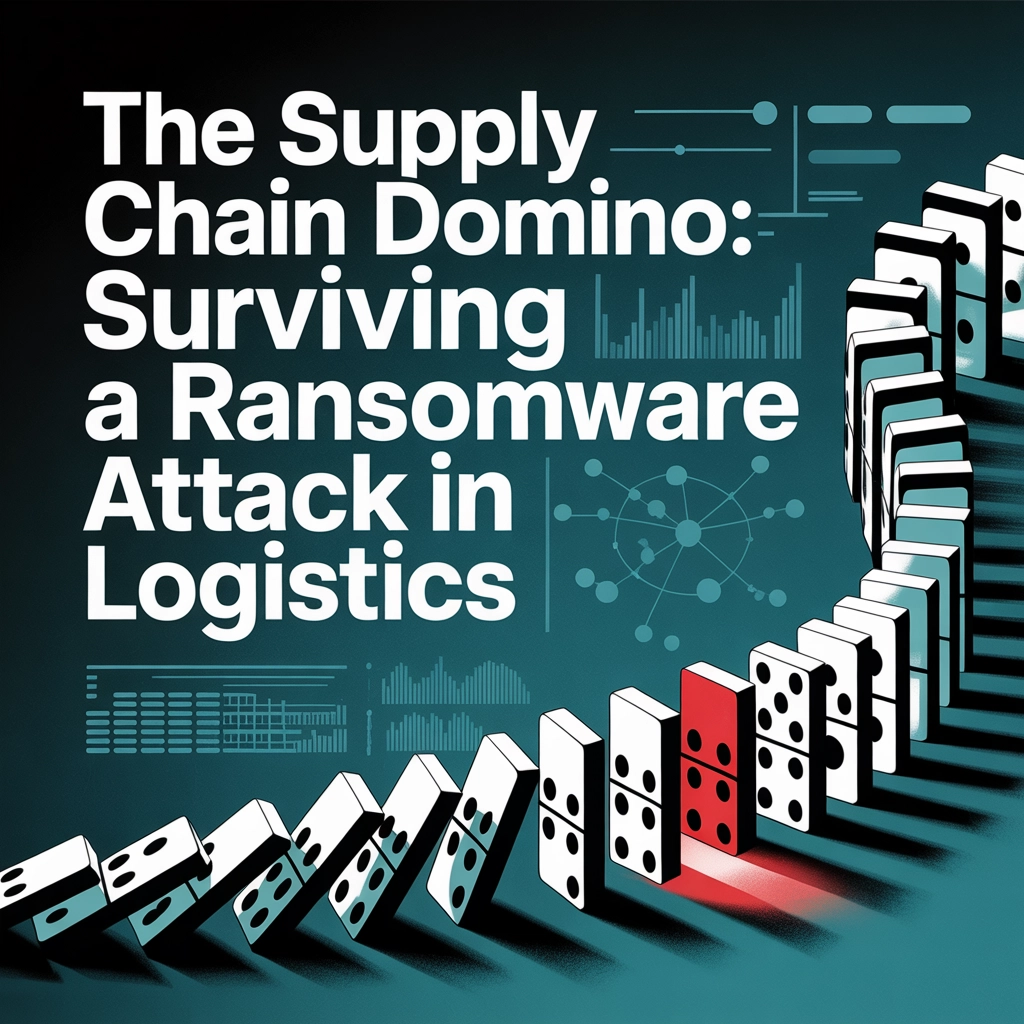The logistics sector has become a prime target for ransomware attackers, with devastating consequences that ripple through entire supply chains. When a single logistics provider falls victim to ransomware, the domino effect can paralyse manufacturing, retail, and distribution networks across multiple countries. Recent high-profile attacks demonstrate just how vulnerable our interconnected supply chains have become, and why proactive security measures: including comprehensive penetration testing services: are no longer optional.
The Anatomy of a Supply Chain Catastrophe
The KNP Logistics Group attack in late 2024 exemplified the devastating domino effect of logistics ransomware. The Dutch logistics giant, which handled supply chain operations for major European retailers and manufacturers, saw its operations completely shut down for over a week. According to industry reports, the attack didn't just impact KNP: it caused production delays at automotive plants in Germany, left retail shelves empty across the Netherlands, and cost the broader European supply chain an estimated €2.8 billion in lost productivity.
Similarly, the 2017 NotPetya attack on shipping giant Maersk demonstrated the global reach of supply chain ransomware. Maersk's own assessment revealed that the attack caused $300 million in losses and disrupted 76 ports worldwide, affecting global trade flows for months.

These incidents illustrate a concerning trend: research from IBM Security shows that supply chain attacks have increased by 51% over the past three years, with logistics companies being 70% more likely to experience ransomware attacks than other sectors.
Why Logistics Companies Are Prime Targets
The logistics industry's unique operational characteristics make it exceptionally vulnerable to ransomware attacks. Unlike many other sectors, logistics operations cannot afford downtime: a truth that ransomware operators exploit ruthlessly.
Just-in-Time Vulnerabilities
Modern supply chains operate on razor-thin margins with just-in-time delivery models. This efficiency comes at the cost of resilience. When Norsk Hydro was hit by ransomware in 2019, the aluminium giant's logistics network ground to a halt, causing production disruptions that lasted months and cost over $75 million.
Legacy System Dependencies
Many logistics companies rely on legacy systems that weren't designed with modern cybersecurity threats in mind. A study by the UK's National Cyber Security Centre found that 68% of logistics firms still use Windows systems that are no longer supported by Microsoft, creating significant security gaps.
Third-Party Ecosystem Complexity
The logistics sector's interconnected nature means that a breach at one company can quickly spread to others. According to research from Ponemon Institute, the average logistics company works with 127 third-party vendors, each representing a potential attack vector.
The Cascading Impact: Understanding the Domino Effect
When ransomware hits a logistics provider, the impact extends far beyond the initial victim. The interconnected nature of modern supply chains means that disruption spreads rapidly through multiple layers of dependencies.
Immediate Operational Impact
The first dominos to fall are typically the logistics company's direct clients. Manufacturing plants may halt production due to missing components, while retailers face empty shelves. The Cabinet Office's assessment of recent supply chain attacks found that 43% of affected businesses experienced operational disruption lasting more than one week.
Financial Ripple Effects
The financial impact extends beyond immediate operational costs. Insurance claims, regulatory fines, and long-term reputational damage compound the initial ransom demands. Analysis by Cyberseek indicates that logistics companies face average total costs of £3.2 million per ransomware incident, with only 40% of firms surviving major attacks without significant downsizing.

Building Resilience: Actionable Survival Strategies
Surviving a ransomware attack in today's interconnected logistics environment requires a multi-layered approach that goes beyond traditional cybersecurity measures.
1. Comprehensive Risk Assessment and Due Diligence
The first line of defence involves understanding your entire attack surface. This means conducting thorough assessments of not just your own systems, but also those of your suppliers and partners.
Supplier Security Standards
Establishing minimum cybersecurity standards for all suppliers is crucial. The UK Government's Cyber Essentials Plus framework provides a solid foundation, but logistics companies should consider more comprehensive requirements including regular penetration testing services and continuous monitoring.
CREST-Certified Penetration Testing
Regular CREST penetration testing helps identify vulnerabilities before attackers do. CREST-certified penetration testing providers offer specialised logistics cybersecurity assessments that simulate real-world supply chain attack scenarios.
2. Network Segregation and Zero-Trust Architecture
Implementing proper network segregation can contain the spread of ransomware even if initial defences fail.
Microsegmentation
Breaking down networks into smaller, isolated segments limits an attacker's ability to move laterally. Network penetration testing services can help identify optimal segmentation strategies that balance security with operational efficiency.
Zero-Trust Implementation
A zero-trust architecture assumes that no user or device should be trusted by default. This approach is particularly effective in logistics environments where multiple partners need access to different systems.

3. Robust Backup and Recovery Procedures
Having reliable backups is essential, but they must be properly protected and regularly tested.
Air-Gapped Backups
Maintaining offline, air-gapped backups ensures that critical data remains accessible even if network-connected systems are compromised. The UK's National Cyber Security Centre recommends following the 3-2-1 rule: three copies of important data, stored on two different media types, with one copy stored offline.
Recovery Testing
Regular recovery testing ensures that backups will work when needed. Many organisations discover their backup systems are inadequate only after an attack has occurred.
4. Incident Response Planning
A well-rehearsed incident response plan can significantly reduce the impact of a ransomware attack.
Cross-Organisational Coordination
Logistics incidents often affect multiple organisations simultaneously. Incident response plans should include procedures for coordinating with suppliers, customers, and regulatory bodies.
Communication Strategies
Clear communication protocols help maintain stakeholder confidence and comply with regulatory requirements. The UK's General Data Protection Regulation requires breach notification within 72 hours in many cases.
The Role of Professional Penetration Testing
Regular penetration testing services play a crucial role in supply chain security, helping organisations identify vulnerabilities before attackers exploit them.
Application Penetration Testing Services
Many ransomware attacks begin by exploiting web application vulnerabilities. Application penetration testing services can identify common weaknesses like SQL injection, cross-site scripting, and authentication bypasses that attackers often use as initial access vectors.
Red Team Penetration Testing
Red team penetration testing simulates sophisticated, multi-stage attacks that mirror the tactics used by advanced ransomware groups. This approach helps organisations understand how an attacker might move through their systems and exfiltrate data before deploying ransomware.
Compliance-Focused Testing
For logistics companies handling payment data or operating in regulated industries, PCI-DSS penetration testing and ISO 27001 penetration testing ensure that security controls meet regulatory requirements.

Building Long-Term Cyber Resilience
Surviving a ransomware attack is just the first step. Building long-term resilience requires ongoing investment in cybersecurity capabilities and continuous improvement of security practices.
Threat Intelligence Integration
Staying informed about emerging threats helps organisations adapt their defences. The UK's National Cyber Security Centre provides regular threat intelligence updates specifically relevant to UK businesses.
Employee Training and Awareness
Human error remains a significant factor in many successful ransomware attacks. Regular training helps employees recognise and respond appropriately to potential threats.
Regular Security Assessments
The threat landscape evolves constantly, and so should security measures. Regular assessments by security testing services help ensure that defences remain effective against new attack techniques.
The Strategic Advantage of Proactive Security
In today's threat landscape, organisations that invest proactively in cybersecurity gain significant competitive advantages. Companies with robust security measures can maintain operations while competitors struggle with attack recovery, capture market share during industry disruptions, and command premium pricing due to their reputation for reliability.
Working with experienced penetration testing companies UK-based organisations like EJN Labs provides access to specialised expertise in logistics cybersecurity. Their CREST-certified assessments help identify vulnerabilities specific to supply chain operations and provide actionable recommendations for improvement.
The supply chain domino effect of ransomware attacks represents one of the most significant business risks facing logistics companies today. However, organisations that take proactive steps to assess their security posture, implement robust defences, and plan for incident response can not only survive attacks but emerge stronger than their competitors.

Success in this environment requires a comprehensive approach that combines technical controls, organisational processes, and strategic partnerships with security professionals. By investing in penetration testing services, implementing strong backup procedures, and maintaining robust incident response capabilities, logistics companies can break the domino chain and protect their operations, customers, and reputation from the growing ransomware threat.












Leave a Reply